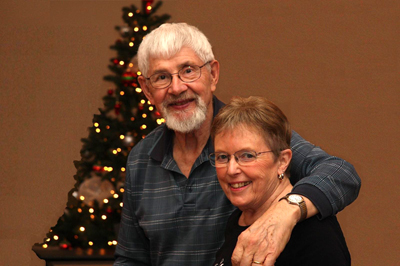Newsroom
Levodopa pumps new life into Ottawa Parkinson’s patient
March 31, 2016

Retired teacher Nick Kaethler, now 75, was the first person in Ottawa to receive a newly approved treatment for advanced Parkinson’s disease that delivers drugs directly to the small intestine. He said the pump has reduced his symptoms and given him back his life.
After 17 years of living with Parkinson's disease, then-74-year-old Nick Kaethler said he was ready to give up the ghost.
In the advanced stages of Parkinson’s disease, the retired teacher could no longer walk unaided or hold a conversation, and the pills he took weren’t working consistently anymore. So, the man who had directed 20 choirs, spent four years travelling North America by motorhome and taught English in China for three years, planned a cruise with his wife, June, certain that the trip would be his last.
But life had other plans. In 2015, Kaethler became the first person in Ottawa to use the levodopa pump, or Duodopa, a newly approved treatment for advanced Parkinson’s disease in Canada. The steady dose of levodopa gel delivered through a hole in his small intestine dramatically improved his muscle control. After an hour Kaethler could walk on his own, something he hadn’t been able to do in months.
“It was magic,” said Kaethler. “I felt I could plan for the future. I had my life again.”
While wearing the portable pump in a fanny pack makes bending over and playing some sports challenging, Kaethler said it’s a small price to pay for having his life back.
His neurologist at The Ottawa Hospital, Dr. Tiago Mestre, is running the Duodopa program at the hospital. He said Kaethler's response to the levodopa pump was expected.
“Levodopa is the oldest and the best drug for Parkinson’s disease. The pump just administers it in a more efficient way,” said Dr. Mestre, who is also an assistant professor at the University of Ottawa. “The levodopa pump has been widely used in Europe for more than 10 years and has continued to be effective over that time for patients with advanced Parkinson’s disease.”
The Ottawa Hospital began offering the pump to patients with advanced-stage Parkinson’s in early 2015, after it was approved by Health Canada and covered by provincial health care, in a joint effort involving Dr. Mestre and Gastroenterologist Dr. Alaa Rostom.
Like deep brain stimulation, the levodopa pump is an option to consider once pills become ineffective at treating the symptoms of Parkinson’s disease. Dr. Mestre noted that the treatment is invasive and not for all Parkinson’s patients. Those interested in learning more should speak to their neurologist or family doctor and consider a referral to the Duodopa program at The Ottawa Hospital.
While the levodopa pump relieves his symptoms for now, Kaethler doesn’t know what new limitations may be on the horizon. Today he’s grateful to be able to attend concerts and social events, win bridge trophies again and sing with his choirs.
“As I get weaker, I’m glad to see there are strong people out there working on this,” said Kaethler.
Dr. Mestre is part of the Parkinson Research Consortium, a group of Ottawa researchers investigating mechanisms and new treatments for this devastating disease. “Research is part of the business of finding life again,” he said.
About The Ottawa Hospital
The Ottawa Hospital is one of Canada’s largest learning and research hospitals with over 1,100 beds, approximately 12,000 staff and an annual budget of over $1.2 billion. Our focus on research and learning helps us develop new and innovative ways to treat patients and improve care. As a multi-campus hospital, affiliated with the University of Ottawa, we deliver specialized care to the Eastern Ontario region, but our techniques and research discoveries are adopted around the world. We engage the community at all levels to support our vision for better patient care.
About the University of Ottawa
The University of Ottawa is home to over 50,000 students, faculty and staff, who live, work and study in both French and English. Our campus is a crossroads of cultures and ideas, where bold minds come together to inspire game-changing ideas. We are one of Canada’s top 10 research universities—our professors and researchers explore new approaches to today’s challenges. One of a handful of Canadian universities ranked among the top 200 in the world, we attract exceptional thinkers and welcome diverse perspectives from across the globe. www.uottawa.ca
For further information, please contact
Amelia Buchanan
Senior Communication Specialist
Ottawa Hospital Research Institute
Office: 613-798-5555 x 73687
Cell: 613-297-8315
ambuchanan@ohri.ca
